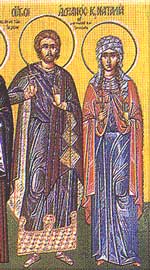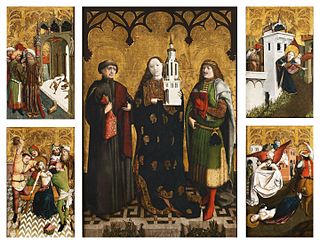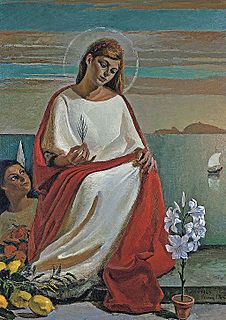Related Research Articles

Agnes of Rome is a virgin martyr, venerated as a saint in the Catholic Church, Oriental Orthodox Church and the Eastern Orthodox Church, as well as the Anglican Communion and Lutheran Churches. St. Agnes is one of several virgin martyrs commemorated by name in the Canon of the Mass.

Adrian of Nicomedia or Saint Adrian was a Herculian Guard of the Roman Emperor Galerius Maximian. After becoming a convert to Christianity with his wife Natalia (Ναταλία), Adrian was martyred at Nicomedia in Asia-Minor (Turkey). Hadrian was the chief military saint of Northern Europe for many ages, second only to Saint George, and is much revered in Flanders, Germany and the north of France.

Catherine of Alexandria is, according to tradition, a Christian saint and virgin, who was martyred in the early fourth century at the hands of the emperor Maxentius. According to her hagiography, she was both a princess and a noted scholar who became a Christian around the age of 14, converted hundreds of people to Christianity and was martyred around the age of eighteen. More than 1,100 years after Catherine's martyrdom, Joan of Arc identified her as one of the saints who appeared to and counselled her.

Philomena, also known as Saint Philomena or Philomena of Rome was a young virgin martyr whose remains were discovered on May 24–25, 1802, in the Catacomb of Priscilla. Three tiles enclosing the tomb bore an inscription, Pax Tecum Filumena, that was taken to indicate that her name was Filumena, the English form of which is Philomena. Philomena is the patron saint of infants, babies, and youth.

The calendar of saints is the traditional Christian method of organizing a liturgical year by associating each day with one or more saints and referring to the day as the feast day or feast of said saint. The word "feast" in this context does not mean "a large meal, typically a celebratory one", but instead "an annual religious celebration, a day dedicated to a particular saint".

Margaret, known as Margaret of Antioch in the West, and as Saint Marina the Great Martyr in the East, is celebrated as a saint on 20 July in the Western Rite Orthodoxy, Roman Catholic Church and Anglicanism, on 17 July by the Eastern Orthodox Church and on Epip 23 and Hathor 23 in the Coptic Orthodox Church of Alexandria.

Lucia of Syracuse (283–304), also called Saint Lucia or Saint Lucy, was a Christian martyr who died during the Diocletianic Persecution. She is venerated as a saint in the Catholic, Anglican, Lutheran, and Eastern Orthodox churches. She is one of eight women explicitly commemorated by Catholics in the Canon of the Mass. Her traditional feast day, known in Europe as Saint Lucy's Day, is observed by Western Christians on 13 December. Lucia of Syracuse was honored in the Middle Ages and remained a well-known saint in early modern England. She is one of the best known virgin martyrs, along with Agatha of Sicily, Agnes of Rome, Cecilia of Rome and Catherine of Alexandria.

Agathaof Sicily is a Christian saint. Her feast is on 5 February. Agatha was born in Catania, part of the Roman Province of Sicily, and was martyred c. 251. She is one of several virgin martyrs who are commemorated by name in the Canon of the Mass.

Saint Cecilia was a Roman virgin martyr and is venerated in Catholic, Orthodox, Anglican, and some Lutheran churches, such as the Church of Sweden. She became the patroness of music and musicians, it being written that, as the musicians played at her wedding, Cecilia "sang in her heart to the Lord". Musical compositions are dedicated to her, and her feast, on 22 November, is the occasion of concerts and musical festivals.

September 26 - Eastern Orthodox liturgical calendar - September 28

Agrippina of Mineo, also known as Saint Agrippina was venerated as a virgin martyr in the Catholic Church and Orthodox Christianity.

Felicitas of Rome, also anglicized as Felicity, is a saint numbered among the Christian martyrs. Apart from her name, the only thing known for certain about this martyr is that she was buried in the Cemetery of Maximus, on the Via Salaria on a 23 November. However, a legend presents her as the mother of the seven martyrs whose feast is celebrated on 10 July. The Eastern Orthodox Church celebrates their martyrdom on 25 January.

Saints Victor and Corona are two Christian martyrs. Victor was a Roman soldier who was tortured and killed; Corona was killed for comforting him. Corona is invoked as a patron of causes involving money; she was not historically associated with pandemics or disease, but has been invoked against the coronavirus pandemic.

Saint Restituta is a Berber saint and martyr of the Roman Catholic and Eastern Orthodox Churches. She was said to have been born in Carthage or Teniza and martyred under Roman Emperor Diocletian. The location and date of her martyrdom are not precisely known. She sometimes is considered one of the Martyrs of Abitinae, Roman Province of Africa, a group of North Africans including St. Dativus, St. Saturninus, et alia, who were martyred in AD 304.

Hripsime, also called Rhipsime, Ripsime, Ripsima, Arbsima or Arsema was a martyr of Roman origin; she and her companions in martyrdom are venerated as some of the first Christian martyrs of Armenia.

Christina of Bolsena, also known as Christina of Tyre, or in the Eastern Orthodox Church as Christina the Great Martyr, is venerated as a Christian martyr of the third century. Archaeological excavations of an underground cemetery constructed over her tomb have shown that she was venerated at Bolsena by the fourth century.

Dorothea of Caesarea is a 4th-century virgin martyr who was executed at Caesarea Mazaca. Evidence for her actual historical existence or acta is very sparse. She is called a martyr of the late Diocletianic Persecution, although her death occurred after the resignation of Diocletian himself.

Saint Odilia is a Saint venerated in the Roman Catholic Church, although according to the current liturgical calendar, her feast day is not officially commemorated. She is a patroness of good eyesight.

Saint Barbara, known in the Eastern Orthodox Church as the Great Martyr Barbara, was an early Christian Lebanese and Greek saint and martyr. Accounts place her in the 3rd century in Heliopolis Phoenicia, present-day Baalbek, Lebanon. There is no reference to her in the authentic early Christian writings nor in the original recension of Saint Jerome's martyrology.

The name Albina comes from Albina, "the White Goddess," the Etruscan goddess of the dawn and protector of ill-fated lovers. It was a common name in ancient Rome. According to Nennius, Britain gains its earliest name, Albion from Albina, the White Goddess, the eldest of the fifty Danaïdes. There appear to be several different women named Albina remembered as saints in the Roman Catholic Church.
References
- ↑ Online, Catholic. "St. Epicharis - Saints & Angels". Catholic Online.
- ↑ Online, Catholic. "St. Epicharis - Saints & Angels". Catholic Online.
- ↑ "The Roman Martyrology - September 27". Archived from the original on 2007-09-30. Retrieved 2007-07-22.